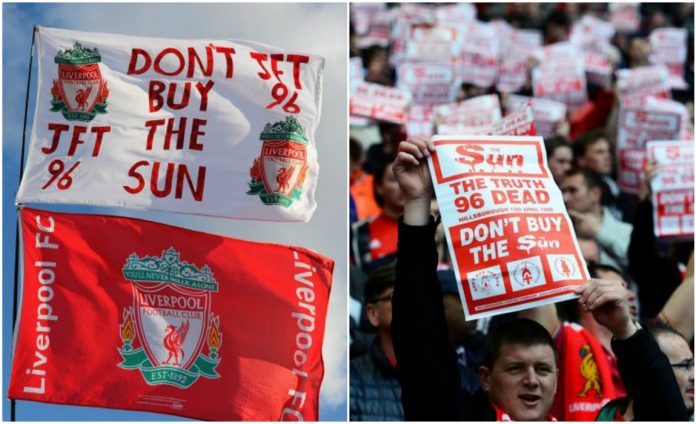Almost three decades after the Hillsborough tragedy, Liverpool Football Club has banned journalists from The Sun newspaper from its stadium and training ground. It is a move that has social resonance well beyond the money saturated realm of the Premier League. And it is a chance to ask why the club demonstrates such an elephantine unwillingness to forget or forgive The Sun’s initial offence – a British national newspaper acting as the propaganda arm for an establishment cover up and a concerted defamation of the innocent dead.
 Immediately after the disaster in 1989, the Kop stand at Anfield was transformed into an avalanche of commemorative flowers and football scarves. The media covered this visually striking event, but what they have never managed to convey in almost three decades, is the depth of sentiment that persisted well beyond the lifespan of those flowers.
Immediately after the disaster in 1989, the Kop stand at Anfield was transformed into an avalanche of commemorative flowers and football scarves. The media covered this visually striking event, but what they have never managed to convey in almost three decades, is the depth of sentiment that persisted well beyond the lifespan of those flowers.
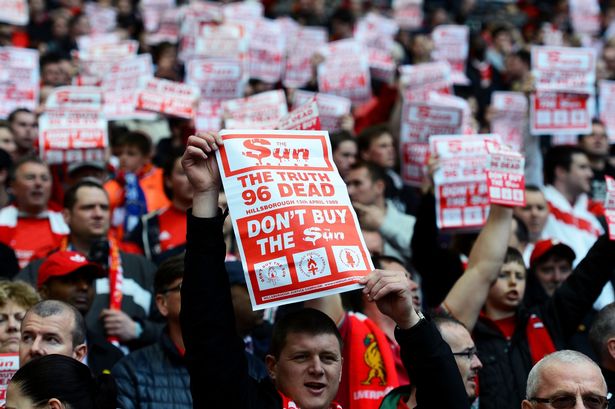 When the tribute was dismantled, the scarves were sold for charity. To this day, I still own two of them – one from Liverpool, the other from Manchester United. The two club scarves were bought twisted together as a poignant reminder of a solidarity that transcends tribal affinity. Fans from visiting clubs now routinely leave keepsakes when they pay their respects at Liverpool’s permanent Hillsborough memorial.
When the tribute was dismantled, the scarves were sold for charity. To this day, I still own two of them – one from Liverpool, the other from Manchester United. The two club scarves were bought twisted together as a poignant reminder of a solidarity that transcends tribal affinity. Fans from visiting clubs now routinely leave keepsakes when they pay their respects at Liverpool’s permanent Hillsborough memorial.
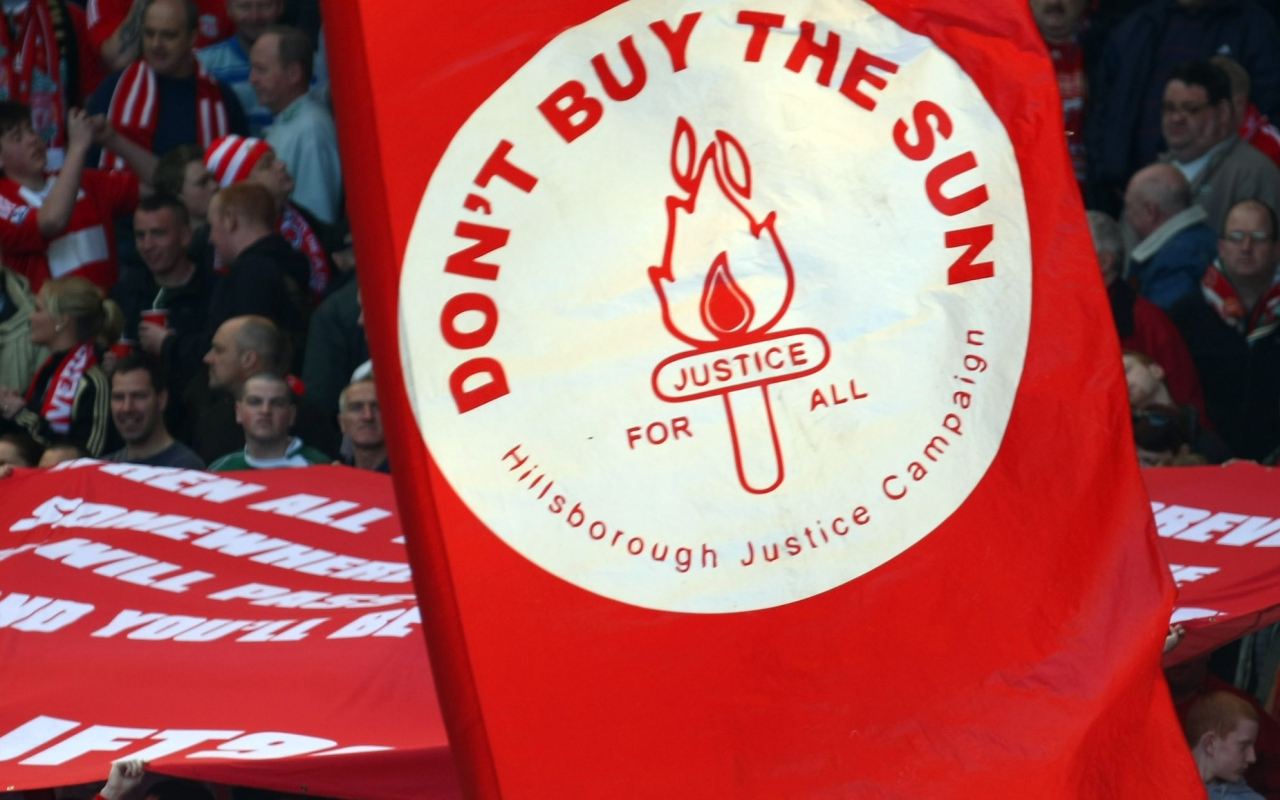 Gemeinschaft is a term used by German sociologist Ferdinand Tönnies to describe the strong bonds of close-knit communities. Its meaning is in contrast to Gesellschaft, which describes the more formal ties of laws and procedures. The Hillsborough tragedy showed two different sides of Gemeinschaft. Journalists, politicians, judges and senior police, nominally the functionaries of Gesellschaft, were able to draw upon their mutually reinforcing networks of powerful familiarity to defame the victims and their guileless families.
Gemeinschaft is a term used by German sociologist Ferdinand Tönnies to describe the strong bonds of close-knit communities. Its meaning is in contrast to Gesellschaft, which describes the more formal ties of laws and procedures. The Hillsborough tragedy showed two different sides of Gemeinschaft. Journalists, politicians, judges and senior police, nominally the functionaries of Gesellschaft, were able to draw upon their mutually reinforcing networks of powerful familiarity to defame the victims and their guileless families.
Liverpool FC’s refusal to forgive The Sun (or as we Liverpudlians refer to it, The S*n) is a visceral reaction. It is the flip side of that title’s trademark targeting of the lowest common denominator attitudes and bigotries of the nation’s working class. In and around Liverpool, The S*n faces a level of resentment that a cut-throat commercial enterprise is unequipped to understand. It comes from a place now seldom seen in a society in which the value of communal longevity has been largely forgotten.
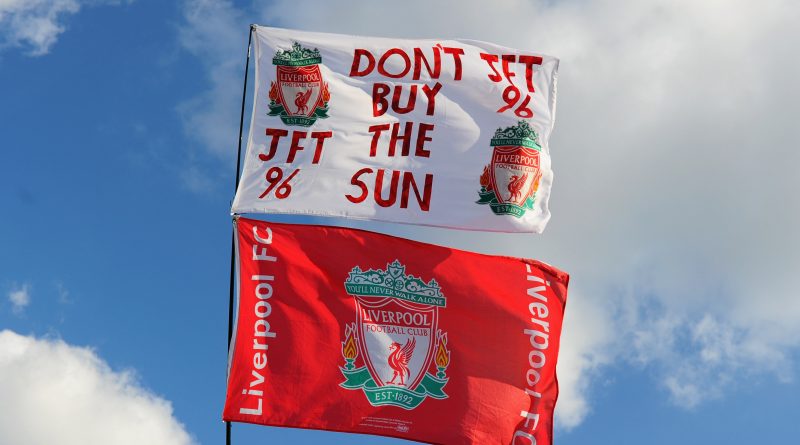 The tabloid modus operandi consists of isolating a story from any meaningful wider context. In this way it can be consumed by those who are too distant to empathise with the subjects of that tale. Liverpool fans broke that chain of commercially-sponsored alienation through a decades long boycott of The S*n, sustained by direct knowledge of the context surrounding Hillsborough. The families of the dead experienced what thousands of other tabloid victims have been subjected to over the years. But in the depths of their sorrow, they found the strength of a whole community to draw upon and resist alongside.
The tabloid modus operandi consists of isolating a story from any meaningful wider context. In this way it can be consumed by those who are too distant to empathise with the subjects of that tale. Liverpool fans broke that chain of commercially-sponsored alienation through a decades long boycott of The S*n, sustained by direct knowledge of the context surrounding Hillsborough. The families of the dead experienced what thousands of other tabloid victims have been subjected to over the years. But in the depths of their sorrow, they found the strength of a whole community to draw upon and resist alongside.
 In an age of celebrities, inoculated from mundane reality by wealth and media-facilitated narcissism, Liverpool fans shared raw grief with the club’s famous former player Kenny Dalglish. The city’s most instantly recognisable adopted son attended funeral after funeral after funeral. Later, those fans also witnessed with great sadness how he succumbed to the inevitable psychological toll that dedication took.
In an age of celebrities, inoculated from mundane reality by wealth and media-facilitated narcissism, Liverpool fans shared raw grief with the club’s famous former player Kenny Dalglish. The city’s most instantly recognisable adopted son attended funeral after funeral after funeral. Later, those fans also witnessed with great sadness how he succumbed to the inevitable psychological toll that dedication took.
The truth hurts
The truth did eventually pierce the media bubble, but “bubble” belies the strength of the membrane and the dishonourable character of its guardians. In 2012, for example, PR man Max Clifford was one of the self-appointed commentariat whose opinion was sought by the media over the continuing newspaper boycott. Suggesting that Liverpool ought to move on, he commented: “It’s a bit like we won’t speak to Germans any more because we had a war with them a long time ago. Obviously in Liverpool The Sun is a bad name but not anywhere else in the country.”
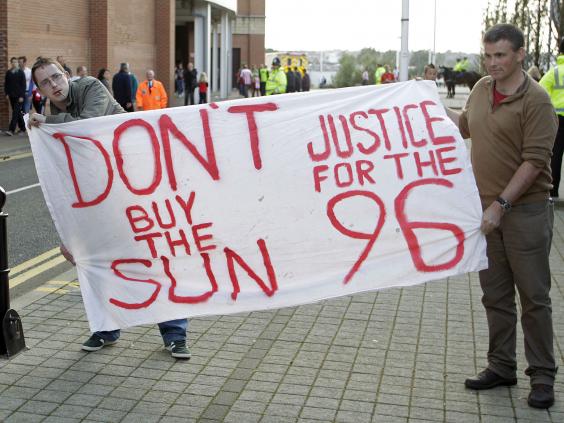 As recently as January 2016, Kelvin Mackenzie, the editor responsible for the infamous “Truth” headline, was deemed to be a suitable panellist for the BBC’s flagship current affairs programme Question Time. Boris Johnson, who, in his infamous Spectator article, sneered at “the deeply unattractive psyche” of Liverpudlians, is now the UK’s foreign secretary.
As recently as January 2016, Kelvin Mackenzie, the editor responsible for the infamous “Truth” headline, was deemed to be a suitable panellist for the BBC’s flagship current affairs programme Question Time. Boris Johnson, who, in his infamous Spectator article, sneered at “the deeply unattractive psyche” of Liverpudlians, is now the UK’s foreign secretary.
The S*n merely represents the provisional wing of the establishment’s style rhetorical forces. At the 20th Hillsborough anniversary Anfield memorial, in a rare and vivid instance of truth speaking directly to power, the government also felt the resentment of its weasel words. The Liverpudlian (Everton supporting) secretary of state for culture, media, and sport, Andy Burnham was forced to stop his speech as sporadic heckling soon gave way to the whole stadium chanting “Justice for the 96”. A visibly chastened minister admirably used the experience as a spur to help obtain the official enquiry that finally exonerated the innocent.
The phrase “Justice for the 96”, is well matched by the lyrics to Liverpool’s well known secular hymn, “You’ll Never Walk Alone”.
“When you walk through a storm, hold your head up high, and don’t be afraid of the dark.”
Singing these words gives voice to the determination of a genuine community who will never walk alone, and will never, ever, allow themselves to be spun by The S*n.

